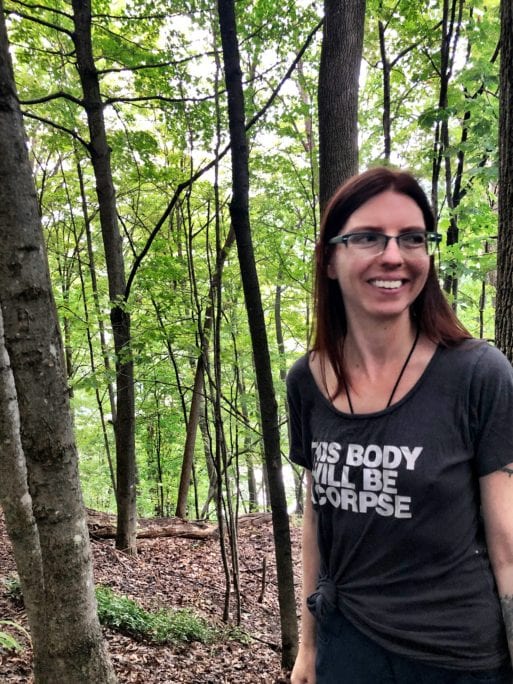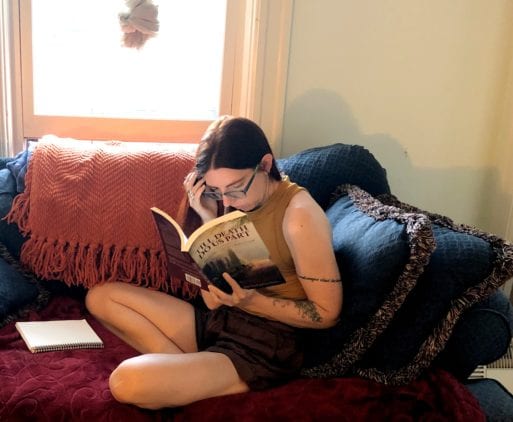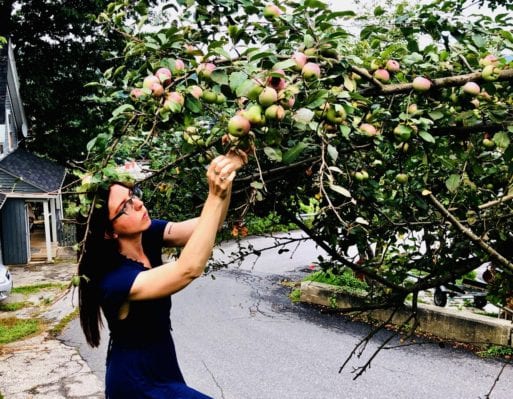
Michelle Acciavatti’s father would always say of her that she “is an expert at fitting square pegs into round holes.” As a licensed funeral director, death worker, educator and activist in Vermont, Acciavatti has done just that, dedicating much of her career to breaking down traditionally accepted ideas and finding ways to approach them anew.
Acciavatti was instrumental in getting green burial legislation passed in Vermont in 2017; subsequently, she and her peers founded the not-for-profit organization Green Burial Vermont. Their goal is to advance statewide green burial options across the country by educating and empowering local ambassadors to do so in their own communities.
Death Studies, too, has undergone interrogation under Acciavatti’s microscope. She is a founding member of The Collective for Radical Death Studies, an international organization that aims to explore death, dying, and the rituals of care from a decolonized perspective. The growing Radical Death Canon centers on the experiences, voices, and deathways interwoven in the fabric of communities of color and marginalized populations that have been affected by systemic and colonial structures.
With the global pandemic, Acciavatti’s most recent work has included articles and webinars on the subject of community, mourning rituals, grief and natural death care during the era of social distancing. As with most meetings these days, Acciavatti and I met via Zoom to discuss her most recent work. Backed by the bright yellow walls of her home, she is warm, engaging, articulate and earnest. Our conversation begins with her standing to show me her T-shirt, which reads “This Body Will Be A Corpse.”
Editor’s note: This interview has been edited for length and readability.
Hi, lovely to meet you. Can you start by sharing how your work in end of life began?
It really started during my undergrad, when I became very interested in the relationship between cognitive development and motor development. That’s what led me to grad school because I thought I wanted to be a neuroscientist. Turns out I hate the work of being a scientist — I’m the daughter of a scientist; I love thinking like a scientist, and I think I embody it in a lot of ways, but the actual work of it is not for me.
But I had a relationship with the Office of Ethics at Boston Children’s Hospital, and they wanted to bring in someone with a background in neuroscience because so many end-of-life situations involved neurological development.
So I was working with the task force that worked with kids in a minimally conscious state. It was very difficult, because I often felt like, here I am, at one of the best — if not the best — children’s hospitals in the world — one that has done so much to help support families and overcome the institutionalized racism that happens in medical communities by involving translators, chaplains that represent different religions, and different support structures.
But then there’s the parents who love their kids and that’s all that matters to them. And they’re being told they have to make a decision about whether or not their child lives. And sometimes it came with a gentle nudge, but it seemed like the parents were really on their own. There was something missing from that end-of-life decision.
The pivotal conversation came when I talked with my friend about what I was feeling. She was a doula and is now a licensed midwife, specializing in home birth and she said to me, “You should be a death doula.”
That was it. I went home and looked it up, and there wasn’t even a Wikipedia entry about it. That was in 2013.

Acciavatti at home reading “Till Death Do Us Part: American Ethnic Cemeteries as Borders Uncrossed,” edited by Allan Amanik and Dr. Kami Fletcher, President of The Collective For Radical Death Studies.
A lot of your work is in advanced planning, but with a focus on community death care and community care. What, in particular, has shaped that part of your work?
I had this experience when my mom’s mom was dying. She had a recurring infection that was literally draining the life out of her. And she said she was done; she didn’t want treatment anymore. And my mom sat with her the whole time.
This made me realize there are ways to be very present for dying. Ways that aren’t new, but have been lost in white communities in particular and are now emerging again. Skills that are being actively sought and found.
If we go back and look at Orthodox Jewish communities or Muslim communities or communities of color, these things are less new, and in fact have always been fairly common — caring for the dead, birthing at home — community support for both of those transitions is much more common. But for me, who had a limited exposure to communities of color, it felt new and novel and like I needed to learn everything that anyone was willing to teach me and reconnect with it.
So, from there, I realized this was what I wanted to do. It tied together everything I was interested in — how does the brain work? What does it really mean to be alive?
And that’s why I believe advanced planning is such an important piece. But for me, it has so much less to do with medical decisions and so much more do to with the question: What does it mean to you to live a full life and live completely?
This is where the values-based approach to your work comes in?
Yes, we all have different things that give value to our lives. But when people are going to be faced with making decisions for you, they need to know why you want interventions or why you don’t. That’s the conversation about medical decisions that matters. It’s been very interesting to sit with people and drill down into what gives their life value.
Because of COVID, a lot of funerals and ceremonies have moved online. What challenges do you see arising from that?
The internet and virtual meetings are a great tool, but that’s what it is. It’s a tool. The internet can help mediate the needs of those who can’t meet and gather, but less so the needs of people who are in closest physical proximity to the person who has died.
But if we view the funeral or memorial service as a social event, where its purpose is to allow people to start accepting that their life no longer contains the person who died, the question is: Do they feel supported?
And that’s the piece that I just don’t think is there. You’re still not held in community and being validated in the community.
How else has social isolation affected the grief process and the ways we meet the needs of the mourning?
In a lot of ways, COVID has taken the individual away from the dying process. When talking about one person out of hundreds of thousands who have died, they often become another statistic, not a person. So, an interesting challenge becomes, how can those who are grieving reclaim them as a person?
For example, take Nick Cordero, the Broadway actor. He was in the hospital for 100 days, and his wife kept him in the public eye constantly, sharing their stories. She centered him as a human being and not just another COVID statistic. And sometimes it was uncomfortable. But at the same time, I knew this guy’s name; I knew his wife’s name; I knew all these things about him. He became a person to me. And when he died, I was upset. His wife had succeeded in not hiding that grief and that process, and she had made him real to so many people.
And I think it’s important to draw a parallel that this is what marginalized people are trying to do every day — trying to be seen as real people. I think that connection is important to make and to hold. And then that expands into — “Okay, so how do we as a white community engage in more public mourning practices?”
We have examples, teachers and things we can learn from — not appropriate, but learn from. And we can look back to our own histories, like mourning clothes or the wreathes we would put on the door to mark that we were mourning. And again, we can learn from communities that have more experience staying present and learning to drop down that veil of “this isn’t socially acceptable” and instead asking, “what do you need supported?”
This also ties into the work that Dr. Alan Wolfelt has done on the needs of the mourning. What it boils down to is that you need to be seen, validated, and heard. You need your loss validated — and that’s true for the individual as well as the community that’s experiencing that loss.
For a long time, our conventional services haven’t really done that. Likewise, the internet is great, but when it comes to sharing stories of the person who died, it adds a level of depersonalization. How do we make this feel more personal? And that has become the work of figuring out how to create new mourning rituals.

What are some of those new mourning rituals?
There’s been this move toward the “honest” obituary, being more honest about how people have died and who they are. The obituary is moving away from encasing people in a demographic way, like “this was so-and-so’s daughter, owner of this store” — and while those details are important because it grounds us in a community, they don’t tell our whole story.
The obituary as a storytelling tool can help the mourning process, but it also requires an ask.
For the grieving, it comes down to asking yourself, “What do I need? Do I need to have this ceremony or ritual made beautiful with music? Or with words? Or with a story?” And then you need to make that intentional ask.
A beautiful example is a widow whose husband had died. They used to have cocktails every evening and say a particular phrase. And so, in his obituary, the family requested that their community, at a certain date and time, lift their glasses and say that phrase.
And even though this idea might be a little abstract, you know everyone is going to be out there raising a glass and toasting you and your loved one and be out there thinking of you. That’s one way of being held. It is a powerful community ritual.
Or if it’s music, maybe you make a playlist that you play and share with everyone. If it’s beautiful words or stories, you can ask people directly to share their stories. Usually people will put more effort into what they’re going to share because they know it’s going to be featured in the ceremony.
But it starts with a very intentional ask — “I am grieving, this is something that will help my mourning process.”
Approaching grief and mourning with intention seems to be the key here.
Yes, it’s this new a la carte model of asking, “What do you want to do?” and then providing choices. Really sitting down and getting to know you in a way that you can start to tell me “This is how I’m feeling,” so it can become a ritual and ceremony that fits those needs and feelings.
And it also becomes COVID-compliant without starting from this place of restriction, from a place of, “Well, we can’t do this or that.” Instead, it’s starting from a place of curiosity and engagement and acknowledgement and grief and loss.
My hope is that by really meeting people on this values-based level, it helps break down all sorts of barriers and there’s an opening for people to come to me however they are, and whatever they need becomes the focal point for how I’m going to be working with them. What do you need? Who was your loved one? What is their story?
It’s about them, it’s not about me. Everything I’ve done was to get the tools and the privileges granted to me by the state in order to be that facilitator in the fullest capacity.
Every death is unique, and my goal is to put that into the work I’m doing. That’s a big piece of what I’m seeing is missing and that’s what I want to do.
How can people find out more about what you do or work with you?
My website is a great place for people to figure out what I do and who I am, and they can contact me through there. I am a licensed funeral director in the state of Vermont, but no longer attached to a funeral home. As a licensed funeral director, I have privileges and power that come with experience and knowledge and working within the system.
If other funeral homes want to bring me in to work with families who are interested in green burial or those who want unique, values-based funeral rituals, I can work with families that way, and I can also provide some level of expertise for home funeral families who want to do it all themselves. And I am going to continue to provide education and support in the community.
I also want to call attention to Vermont Natural Burial, which is looking to create a space for both natural burial and land-based ceremonies to allow people to develop after-death rituals that are in service of the body and also in service with their own grief and mourning.
My dad always said I was an “expert” at putting square pegs in round holes … and maybe what I’m doing now is carving a square hole for once.

 When Funerals Move Online, How Can We Create Mourning Rituals That Truly Validate Loss?
When Funerals Move Online, How Can We Create Mourning Rituals That Truly Validate Loss?


 Our Annual Seven Holiday Gifts for Someone Who Is Grieving, 2024 Edition
Our Annual Seven Holiday Gifts for Someone Who Is Grieving, 2024 Edition
 “Making Mobiles” by Karolina Merska
“Making Mobiles” by Karolina Merska
 “Hands Up to the Sky” by Michael Franti & Spearhead
“Hands Up to the Sky” by Michael Franti & Spearhead















A beautiful piece-very sensitive and informative
Report this comment
Thanks Doreen! We are thrilled to have such a meaningful interview!
Report this comment
Michelle, what a wonderful combination of skills and insights you have to offer. This is so needed and especially in the Covit era when every day you see numbers of deaths adding up..but each one is indeed an individual and so important. You are offering a very important service to everyone in mourning and those of us who remain and need to honor our dead. Thank you.
Report this comment
Yes a beautiful interview. Truly an enlightening one especially given Covid with so many at a loss on how to handle life and death. Wonderful suggestions!
Report this comment
Hi, i believe that i saw you visited my weblog
so i got here to go back the favor?.I am trying to to find issues to enhance my website!I assume its good
enough to use some of your ideas!!
Report this comment
A friend of mine was hosting Death Cafes, mostly in the Rutland VT area. This information in this article would fit into that venue really well, as well as in hospice training which I have had. Thank you both to Michelle and Colleen
Report this comment
Hi Becky,
I agree to would be perfect for a Death Cafe conversation. Your friend may appreciate the suggestion.
Suzette
Report this comment
Having a home funeral can also help the grieving process — facing the reality of the death rather than being left in ‘netherland’, personalization of deathcare and deep gestalt effect of being ‘hands on’, spontaneous ritual as they arise organically, and creating (with others involved) a community of grieving that gives permission to grieve with each others (without the modern fear of triggering someone else’s, or your own, grief and it never stopping).
Report this comment
Hi Pashta,
So nice of you to offer your expertise. very well expressed point in your words. Thanks for sharing.
Suzette
Report this comment